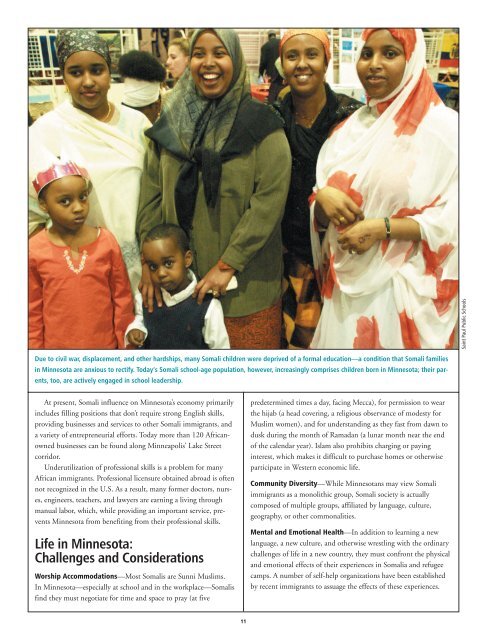Immigration in Minnesota - The Minneapolis Foundation
Immigration in Minnesota - The Minneapolis Foundation
Immigration in Minnesota - The Minneapolis Foundation
You also want an ePaper? Increase the reach of your titles
YUMPU automatically turns print PDFs into web optimized ePapers that Google loves.
Due to civil war, displacement, and other hardships, many Somali children were deprived of a formal education—a condition that Somali families<br />
<strong>in</strong> M<strong>in</strong>nesota are anxious to rectify. Today’s Somali school-age population, however, <strong>in</strong>creas<strong>in</strong>gly comprises children born <strong>in</strong> M<strong>in</strong>nesota; their parents,<br />
too, are actively engaged <strong>in</strong> school leadership.<br />
At present, Somali <strong>in</strong>fluence on M<strong>in</strong>nesota’s economy primarily<br />
<strong>in</strong>cludes fill<strong>in</strong>g positions that don’t require strong English skills,<br />
provid<strong>in</strong>g bus<strong>in</strong>esses and services to other Somali immigrants, and<br />
a variety of entrepreneurial efforts. Today more than 120 Africanowned<br />
bus<strong>in</strong>esses can be found along M<strong>in</strong>neapolis’ Lake Street<br />
corridor.<br />
Underutilization of professional skills is a problem for many<br />
African immigrants. Professional licensure obta<strong>in</strong>ed abroad is often<br />
not recognized <strong>in</strong> the U.S. As a result, many former doctors, nurses,<br />
eng<strong>in</strong>eers, teachers, and lawyers are earn<strong>in</strong>g a liv<strong>in</strong>g through<br />
manual labor, which, while provid<strong>in</strong>g an important service, prevents<br />
M<strong>in</strong>nesota from benefit<strong>in</strong>g from their professional skills.<br />
Life <strong>in</strong> M<strong>in</strong>nesota:<br />
Challenges and Considerations<br />
Worship Accommodations—Most Somalis are Sunni Muslims.<br />
In M<strong>in</strong>nesota—especially at school and <strong>in</strong> the workplace—Somalis<br />
f<strong>in</strong>d they must negotiate for time and space to pray (at five<br />
11<br />
predeterm<strong>in</strong>ed times a day, fac<strong>in</strong>g Mecca), for permission to wear<br />
the hijab (a head cover<strong>in</strong>g, a religious observance of modesty for<br />
Muslim women), and for understand<strong>in</strong>g as they fast from dawn to<br />
dusk dur<strong>in</strong>g the month of Ramadan (a lunar month near the end<br />
of the calendar year). Islam also prohibits charg<strong>in</strong>g or pay<strong>in</strong>g<br />
<strong>in</strong>terest, which makes it difficult to purchase homes or otherwise<br />
participate <strong>in</strong> Western economic life.<br />
Community Diversity—While M<strong>in</strong>nesotans may view Somali<br />
immigrants as a monolithic group, Somali society is actually<br />
composed of multiple groups, affiliated by language, culture,<br />
geography, or other commonalities.<br />
Mental and Emotional Health—In addition to learn<strong>in</strong>g a new<br />
language, a new culture, and otherwise wrestl<strong>in</strong>g with the ord<strong>in</strong>ary<br />
challenges of life <strong>in</strong> a new country, they must confront the physical<br />
and emotional effects of their experiences <strong>in</strong> Somalia and refugee<br />
camps. A number of self-help organizations have been established<br />
by recent immigrants to assuage the effects of these experiences.<br />
Sa<strong>in</strong>t Paul Public Schools


